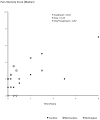Prognostic value of quality of life and pain in patients with locally recurrent rectal cancer
- PMID: 21132391
- PMCID: PMC3187928
- DOI: 10.1245/s10434-010-1218-6
Prognostic value of quality of life and pain in patients with locally recurrent rectal cancer
Abstract
Background: Care of patients with locally recurrent rectal cancer (LRRC) requires careful patient selection. While curative resection offers survival benefits, significant trade-offs exist for the patient. Knowledge of patient-reported outcomes will help inform treatment decisions.
Methods: Quality of life (QOL) and pain were prospectively assessed in 105 patients treated for LRRC at a single institution, using the validated Functional Assessment of Cancer Therapy-Colorectal (FACT-C) and Brief Pain Inventory (BPI) questionnaires. In 54 patients enrolled and followed from diagnosis of LRRC, relationship between pretreatment pain, QOL, and overall survival (OS) were examined.
Results: Patients underwent curative surgical resection (C, 59%), noncurative surgery (NC, 12%) or nonsurgical treatment (NS, 28%). Median OS was 7.1, 1.4, and 1.9 years, respectively (C versus NC: p < 0.001; C versus NS: p = 0.006; NC versus NS: p = 0.261). Physical well-being QOL differed over time (p = 0.042), with greatest difference between C and NC surgery patients (p = 0.049). The remaining QOL domain scores and pain scores demonstrated no significant time or treatment effect. For the 54 patients assessed from diagnosis, median OS was independently predicted by treatment group (C, NC, NS: 4.3, 1.7, versus 2.4 years; p < 0.001) and pretreatment pain intensity (score ≤ 4 versus > 4: 3.8 versus 2.0 years; p = 0.001).
Conclusion: Curative surgery offered prolonged survival, but significant pain exists among long-term survivors and should be a focus of survivorship care. Noncurative surgery did not offer apparent advantages over nonsurgical palliation. Patient's pretreatment pain has prognostic value, and should be assessed, treated, and considered in treatment decisions.
Figures





Comment in
-
The Role of Intersphincteric Resection in Very Low Rectal Cancer.Ann Surg Oncol. 2017 Dec;24(Suppl 3):612-613. doi: 10.1245/s10434-017-6150-6. Epub 2017 Oct 25. Ann Surg Oncol. 2017. PMID: 29071661 No abstract available.
References
-
- Sauer R, Becker H, Hohenberger W, et al. Preoperative versus postoperative chemoradiotherapy for rectal cancer. N Engl J Med. 2004;351:1731–40. - PubMed
-
- Nielsen MB, Laurberg S, Holm T. Current management of locally recurrent rectal cancer. Colorectal Dis. 2009 - PubMed
-
- Camilleri-Brennan J, Steele RJ. The impact of recurrent rectal cancer on quality of life. Eur J Surg Oncol. 2001;27:349–53. - PubMed
MeSH terms
Grants and funding
LinkOut - more resources
Full Text Sources
Medical
Miscellaneous

